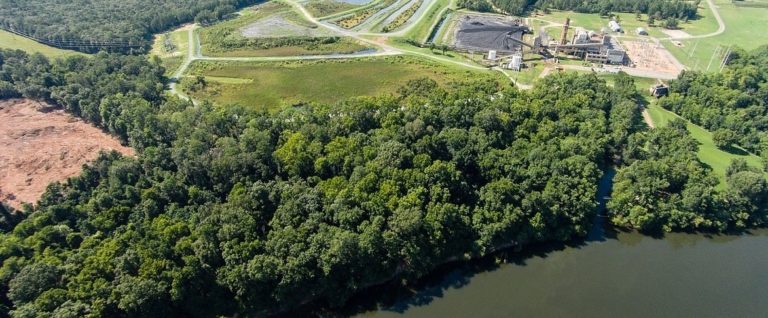Gulf Power and Conservation Groups Agree on Plan to Contain Coal Ash Pollution along Apalachicola River
By: Waterkeeper Alliance

Company Will Take Measures to Move Toxic Threat Away from Apalachicola River
TALLAHASSEE – In a landmark legal settlement reached today with three conservation groups, Gulf Power Company has agreed to take steps to protect North Florida’s famed Apalachicola River from toxic coal ash waste that is stockpiled at the company’s 62-year-old Scholz Generating Plant near Sneads, Florida.
Hundreds of thousands of tons of coal ash, which contains an array of toxic heavy metals like arsenic and lead, currently sits in leaking, unlined waste lagoons atop a bluff overlooking the river. After water samples taken by Waterkeeper Alliance and Apalachicola Riverkeeper indicated pollutants were leaking from the lagoons into the river, Earthjustice sued Gulf Power under the federal Clean Water Act on behalf of the Waterkeeper groups, who were joined by the Southern Alliance for Clean Energy. In the 2014 suit, the groups raised concerns that the earthen berms surrounding the coal ash could suddenly give way and cause a massive coal ash spill, devastating the entire scenic river and its delicate estuary downstream.
Under today’s settlement agreement, Gulf Power will develop a plan to dry out and remove the coal ash from the unlined ponds, transferring it to a new onsite landfill located further away from the river and out of its flood zone. The company will install an impermeable cover over the landfill and a subterranean “cutoff wall” to prevent groundwater from flowing beneath the landfill where it could cause contaminants to leak out of the ash.
Once construction is complete, Gulf Power will continue monitoring groundwater around the landfill to ensure that pollutants are not escaping into the environment. The closure plan is subject to approval by Florida’s Department of Environmental Protection, however the parties do not expect objections from regulators, according to the settlement document. Gulf Power also agreed to consult with the conservation groups during the permitting process to discuss additional details of the closure plan.
“Coal ash waste is a huge pollution problem that threatens waterways and drinking water supplies all over the country,” said Earthjustice attorney Bradley Marshall. “When a pipe broke and sent 140,000 tons of toxic coal ash and wastewater into the Dan River in North Carolina last year, it coated the river bottom for 70 miles downstream. We don’t want that to happen to the Apalachicola. We are encouraged that Gulf Power has agreed to take these protective measures at its Scholz Generating Plant to remove the threat to the Apalachicola.”
Apalachicola Riverkeeper Dan Tonsmeire emphasized the importance of the Apalachicola River and Bay, which support a multi-billion seafood industry in the Gulf of Mexico. “The Apalachicola River is one of the most biologically-diverse waterways in the country, and we are pleased that Gulf Power is recognizing its importance with this agreement. By moving quickly to resolve these concerns, Gulf Power is demonstrating the type of industry leadership needed to protect and preserve our valuable natural resources for our future generations.”
Amelia Shenstone, who directs the High Risk Energy Program for the Southern Alliance for Clean Energy, said forty percent of all the coal ash dumps in the nation are located in the Southeast, and most require immediate attention to prevent more large-scale environmental disasters such as the 2008 coal ash spill in Kingston, Tennessee and last year’s spill in North Carolina. Shenstone noted that the $40-billion Southern Company, Gulf Power’s parent company, has more coal ash ponds than any other utility in the country except for Duke Energy.
“This settlement is a step in the right direction,” Shenstone said. “We’re encouraged to see Gulf Power working with us on a solution that protects the Apalachicola River and the communities that depend on it from a major catastrophe.”
Gulf Power permanently retired the Scholz plant in April, however the company’s plans for the coal ash lagoons at the site were less certain, said Peter Harrison, an attorney for Waterkeeper Alliance.
“The EPA adopted new federal regulations for coal ash dumps last year, however those regulations don’t apply to ash ponds at shuttered plants like Scholz,” Harrison explained. “While we would always prefer to see coal ash stored in fully-lined landfills far away from water, we believe our settlement today will eliminate the risk of a major spill along the Apalachicola.” Harrison added that Gulf Power may have to take additional measures to contain the ash if post-closure monitoring indicates continuing groundwater contamination.
CONTACTS:
Bradley Marshall, Earthjustice (850) 681-0031
Pete Harrison, Waterkeeper Alliance (828) 582-0422, [email protected]
Jennifer Rennicks, Southern Alliance for Clean Energy (865) 235-1448
Dan Tonsmeire, Apalachicola Riverkeeper (850) 508-7787